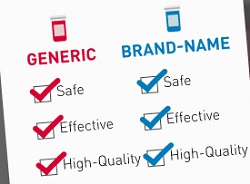Branded medicines, also known as innovator brands or research brands, are the result of extensive research and development (R&D) by pharmaceutical companies. These medicines are the first of their kind, containing new active ingredients and undergoing rigorous testing to ensure efficacy, safety, and quality.
- Clinical Trials: Before entering the market, these medicines go through multiple phases of clinical trials to evaluate their performance and side effects.
- Patent Protection: Branded medicines are protected by patents for up to 20 years, giving exclusive rights to the innovator company for production and sales.
- Cost: Due to the high investment in research, testing, and development, branded medicines are expensive and often unaffordable for many patients.
What Are Generic Medicines?
Generic medicines are cost-effective alternatives to branded medicines that become available once the patent protection expires. These medicines:
- Contain the same active ingredients as their branded counterparts.
- Are equally effective and safe, meeting strict quality standards.
- Are sold under the generic molecule name instead of a brand name.
Since generic manufacturers do not bear the burden of R&D expenses, these medicines are significantly cheaper. Their affordability increases accessibility and helps improve healthcare outcomes globally.
What Are Branded Generic Medicines?
Branded generic medicines bridge the gap between affordability and branding. These are generic medicines marketed under a specific brand name chosen by the pharmaceutical company.
- Active Ingredients: Identical to those in branded or generic medicines.
- Cost: While cheaper than branded medicines, branded generics are slightly more expensive than standard generics.
Nepal’s Pharmaceutical Market: A Snapshot
The Nepali pharmaceutical industry is dominated by branded generic medicines, which hold a crucial position in the market. Here are some key insights:
- Over 70 local pharmaceutical companies produce branded generics.
- Nepal does not currently have manufacturers producing standard generic medicines.
- The country imports various branded generics from India and other nations.
- As of 2023, Nepal has 20,233 registered medicines, the majority being branded generics.
Why Is This Important for Nepal’s Healthcare?
While doctors may prescribe generic medicines, patients in Nepal often end up receiving branded generics. These medicines are widely available and play a pivotal role in making healthcare accessible in a country where standard generics are not yet produced locally.
Understanding the difference between branded, generic, and branded generic medicines is essential for making informed decisions about healthcare. Branded generics dominate Nepal's pharmaceutical market, ensuring accessibility and affordability for the majority of patients.
For affordable and quality healthcare solutions, ensuring a balanced approach to medicine production and distribution is key. Explore more insights into Nepal's healthcare and pharmaceutical advancements on our website.
